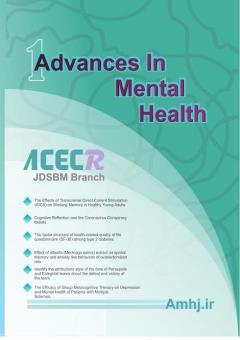About the journal
تازه های سلامت روان
Recent Articles
-
Open Access Article
1 - The Efficacy of Group Metacognitive Therapy on Depression and Mental health of Patients with Multiple Sclerosis
Narges EftekhariIssue 1 , Vol. 1 , Summer 2020 -
Open Access Article
2 - The Effects of Transcranial Direct Current Stimulation (tDCS) on Working Memory in Healthy Young Adults
Nima ganji Roza Rashedi نگار کریمی پروانه فرهاد بیگی Ali Akbar Soleimani Azam Noferesti Mohammad Hossein Abdollahi Fatemeh Moin Al-GhorabaeiIssue 1 , Vol. 1 , Summer 2020 -
Open Access Article
3 - Cognitive Reflection and the Coronavirus Conspiracy Beliefs
Hashem Sadeghiyeh Iman Khanahmadi پروانه فرهاد بیگی نگار کریمی Nima ganjiIssue 1 , Vol. 1 , Summer 2020 -
Open Access Article
4 - Effect of alfaalfa (Medicago sativa) extract on spatial memory and anxiety like behaviors of ovariectomized rats
Hadi Semizeh Seyed Reza Fatemi Tabatabaei Naeem Erfanimajd Ali ShahriariIssue 1 , Vol. 1 , Summer 2020 -
Open Access Article
5 - Identify the attributions style of the fans of Persepolis and Esteghlal teams about the defeat and victory of the team
پروانه فرهاد بیگی Rada Habibi Aida AyaziIssue 1 , Vol. 1 , Summer 2020
Most Viewed Articles
-
Open Access Article
1 - The Effects of Transcranial Direct Current Stimulation (tDCS) on Working Memory in Healthy Young Adults
Nima ganji Roza Rashedi نگار کریمی پروانه فرهاد بیگی Ali Akbar Soleimani Azam Noferesti Mohammad Hossein Abdollahi Fatemeh Moin Al-GhorabaeiIssue 1 , Vol. 1 , Summer 2020 -
Open Access Article
2 - Effect of alfaalfa (Medicago sativa) extract on spatial memory and anxiety like behaviors of ovariectomized rats
Hadi Semizeh Seyed Reza Fatemi Tabatabaei Naeem Erfanimajd Ali ShahriariIssue 1 , Vol. 1 , Summer 2020 -
Open Access Article
3 - Identify the attributions style of the fans of Persepolis and Esteghlal teams about the defeat and victory of the team
پروانه فرهاد بیگی Rada Habibi Aida AyaziIssue 1 , Vol. 1 , Summer 2020 -
Open Access Article
4 - The Efficacy of Group Metacognitive Therapy on Depression and Mental health of Patients with Multiple Sclerosis
Narges EftekhariIssue 1 , Vol. 1 , Summer 2020 -
Open Access Article
5 - Cognitive Reflection and the Coronavirus Conspiracy Beliefs
Hashem Sadeghiyeh Iman Khanahmadi پروانه فرهاد بیگی نگار کریمی Nima ganjiIssue 1 , Vol. 1 , Summer 2020


